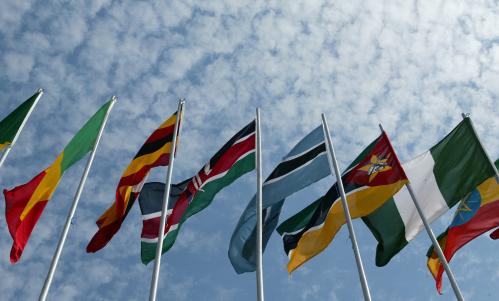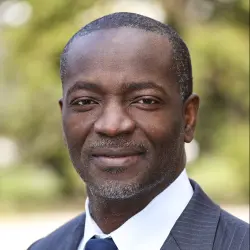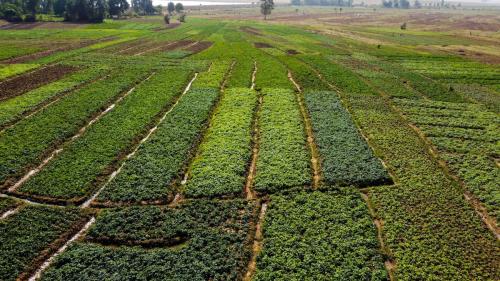 Dr. Brahima Coulibaly, formerly chief of the emerging market economies group at the Board of Governors of the Federal Reserve System, was named director of the Africa Growth Initiative at late last month.
Dr. Brahima Coulibaly, formerly chief of the emerging market economies group at the Board of Governors of the Federal Reserve System, was named director of the Africa Growth Initiative at late last month.
In this post, Coulibaly discusses the big issues facing Africa today and answers some of the key questions that will shape AGI’s research agenda in 2017 and beyond.
Q1: Washington is a town full of policy experts. How do you think AGI can best contribute to the conversation on African growth and development?
Coulibaly: Indeed, Washington, DC is hub of think tanks and policy experts working on African issues, which is a testament to the importance of the African continent. One of the good things about proliferation of policy experts in the area is the diversity of expertise and focus. For example, security experts focus on risks like those associated with Boko Haram in Nigeria, al-Shabaab in eastern Africa, or piracy off the coast of Somalia and in the Gulf of Guinea. A swath of humanitarian experts raise awareness about tragedies in fragile states such as in South Sudan or the Central African Republic or the famine that is currently threatening lives of millions on the continent. Foreign policy experts are often now focusing on topics related to the growing presence of China on the continent and implications for the U.S.-Africa relations or the advent of democracy, the electoral process, and political transitions. All of these issues are very important for Africa, and we all benefit from the analyses coming out of other institutions.
At the Africa Growth Initiative (AGI) at Brookings, our niche is to provide an economic lens to these interrelated issues to pull together disparate narratives. I, along with our AGI scholars and network of researchers, conduct independent, high-quality research on how Africa can maintain its growth momentum and broaden the benefits to achieve sustainable development. We also bring in African voices to Washington and provide a bridge between academics and other experts with policy makers. Our approach places AGI and Brookings as an independent voice, and a neutral broker for policy and policy dialogue.
Q2: The global trade, aid, and political environments are rapidly evolving. How might Africa adapt to these new developments?
Coulibaly: Global trade has slowed over the past several years due in part to structural factors and, since late 2014, the drop in commodity prices, especially for oil. Several African economies are highly dependent on commodity exports and have been hit particularly hard. Nigeria, sub-Saharan Africa’s largest economy, is a prime example. The country’s economic growth declined significantly over the past years and turned negative in 2016 for the first time since 1991. Unfortunately, the outlook for commodity prices remains uninspiring.
In addition, growing discontent with globalization as well as changing political environments are causing governments in advanced economies to revisit their commitments to globalization and development financing. Moreover, financial markets around the world are bracing for higher global interest rates as the Federal Reserve continues to remove monetary policy accommodation.
All of these factors present significant challenges for African economies and, importantly, remind us of the urgency to accelerate reforms to diversify the economies and make them more resilient to various shocks. These reforms include reducing dependence on exports of primarily commodities and speeding up industrialization and local structural transformation. Policymakers should also aim to boost domestic revenues through more effective revenue collection, as better management of public finances will provide more sustainable financing for economic development.
African policymakers have made significant strides over the past two decades to improve the management of their economies, and I am optimistic that they will rise to these new challenges although it will not be easy. In AGI, they will have a devoted partner: A large part of our work is to monitor economic developments and assess the best policies to balance the needs to preserve macroeconomic stability and sustain progress toward the post-2015 development agenda.
Q3: Despite its progress, the continent continues to face challenges in human and economic development, insecurity, and external obstacles. What do you see as the greatest risks to the continent in the next 12 months?
Coulibaly: The continent has made significant progress over the past two decades or so, with economic growth averaging 5 percent. As noted, in the last two years growth has stalled, and human and economic development, which was already lagging behind, further deteriorated. Even though the poverty rate had declined, the number of people living in poverty has not, and inequality continues to be higher than in developing countries outside Africa. Policies should ensure that the benefits of future economic growth are shared broadly by diversifying the economies and adopting efficient redistributive policies.
Over the next 12 months, we expect the region to begin recovering from the effect of the large decline in commodity prices. Over 15 of African economies are projected to grow at a 5 percent rate or higher, compared with a global growth rate of 3.5 percent, and half of the 10 fastest growing economies will be on continent, including Côte d’Ivoire (where I happen to be from originally), Ethiopia, Tanzania, etc. That said, the adjustment to the terms of trade shock is not fully complete. There could be risks of macroeconomic stability in some countries. We are closely watching the situation in South Africa where credit rating agencies Standard and Poor’s and Fitch have recently downgraded the country’s credit rating to junk status. In Nigeria, the fiscal situation has worsened and efforts to stabilize the naira are still playing out. Together, South Africa and Nigeria represent roughly half of the continent’s GDP. It is important that these two economies regain momentum.
The external environment is also likely to remain challenging. The ongoing structural transformation of the Chinese economy will likely restrain demand for commodities, especially the primary exports of many Africa countries. With the tighter global financing conditions, African countries might not be able to issue debt on the same favorable terms as in the past years when interest rates were very low. We have also seen an appreciation of the U.S. dollar since late 2014, which could cause external debt servicing cost to rise and squeeze public finances.
Among the domestic risks, the security situation is certainly a cause for concern and efforts to combat it should be supported. Fortunately, the situation is confined to a few areas so far. We are also watching the political climate with the protests to oust Zuma in South Africa and upcoming elections in some countries such as Angola, Kenya, Liberia, Rwanda, and Sierra Leone. The current political climate in DRC, one the largest African countries, is a cause for concern.
To be clear, Africa doesn’t face only negative risks; there are positive developments across the continent that tend to get lost in the narrative. For example, the recent increase in Chinese outward capital flows represents an opportunity for Africa. At the Forum on China-Africa Cooperation (FOCAC) in 2015, China pledged to invest about $60 billion on the continent through 2018 and there is scope for Africa to attract a larger amount. China is also looking to export about 80 million jobs amid rising wages in the country. Africa’s ample labor force and competitive wages puts it in a good position to attract those jobs.
More broadly, economic management on the continent has been improving, and some of growth performance of the past two decades reflect this progress. Information and communication technology (ICT) is opening up possibilities for innovation, entrepreneurship, and social inclusion. For example, technology is allowing financial inclusion and mobilization of domestic resources across the continent. The latest example is Kenya’s launch of the world’s first mobile government bond (M-Akiba), which allowed small savers to earn higher returns on their savings and the government to tap into a pool of saving that was out of reach. Although small in scale, the symbolism is significant. It suggests that Africans are no longer content with adapting innovations made elsewhere; they are venturing into unchartered territories to become first movers on the global stage. There are other examples of ICT unlocking innovative potential in areas such as education, logistics, etc. Broadening these successful cases and scaling them up will be transformational.
Q4: What research by AGI scholars can we look forward to in the coming months?
Coulibaly: Our AGI scholars and team of experts are working on several important topics that I believe will offer fresh perspectives on the economic issues facing the continent. An important area of research for us is domestic resource mobilization. Historically, domestic resources have been the primary source of development financing. In Africa, domestic savings, at around 15 percent of its GDP on average and the lowest in the world, are currently insufficient to finance investment needs of at least 25 to 30 percent of GDP. For AGI, this topic is at the forefront of Africa’s development challenge. I believe that Africa has the necessary resources to finance much of its development projects. It needs to harness them and efficiently align their usage with the development agenda. Our scholars will be assessing, for example, inefficiencies in revenue mobilization processes and making policy recommendations on how to boost domestic savings.
The next phase of economic development for Africa is industrialization and structural transformation. At the moment, most African economies appear to be moving from agriculture to services, leapfrogging industrial development. It is concerning because the services sector in Africa has very low productivity. Given the continent’s large pool of unemployed and globally competitive wages, it should be attracting global manufacturing clusters to help absorb its ample supply of labor. We are also working on how African economies can further leverage ICTs to bring innovative solutions to the various challenges they face.
The quest for better opportunities is contributing to illegal migration and to a rapid increase in the rate of urbanization that outpaces the absorption capacity of cities, causing many to live in deleterious conditions in slums. The empowerment of the youth and women is high up in our research agenda, and our experts in urban development will continue, for example, to assess policies to better prepare for this rapid urbanization.
We are also keen on bringing our economic lens to the understanding of fragile states by exploring the interplay between economic development, and security and humanitarian issues in these countries. Finally, the AGI team is conducting a series of studies on ending rural hunger—which will inform policies on achieving food security, and end rural hunger and tragedies like the current threat of famine on parts of the continent.
As you can see, AGI has a hefty research agenda to provide refreshing perspectives and novel policy recommendations to important questions facing the continent. In the process, we look forward to engaging all stakeholders and benefit from their feedback and suggestions through our various events and convenings.
The Brookings Institution is committed to quality, independence, and impact.
We are supported by a diverse array of funders. In line with our values and policies, each Brookings publication represents the sole views of its author(s).







Commentary
Four questions for the new director of the Africa Growth Initiative at Brookings
April 26, 2017